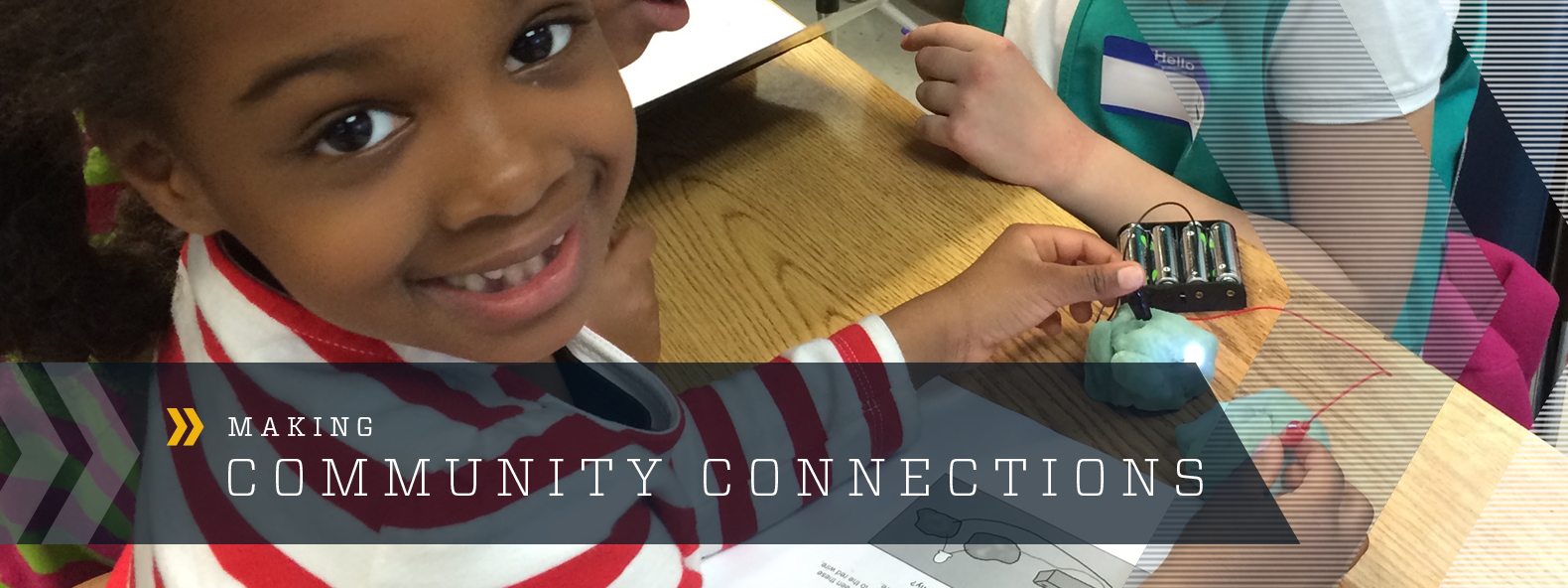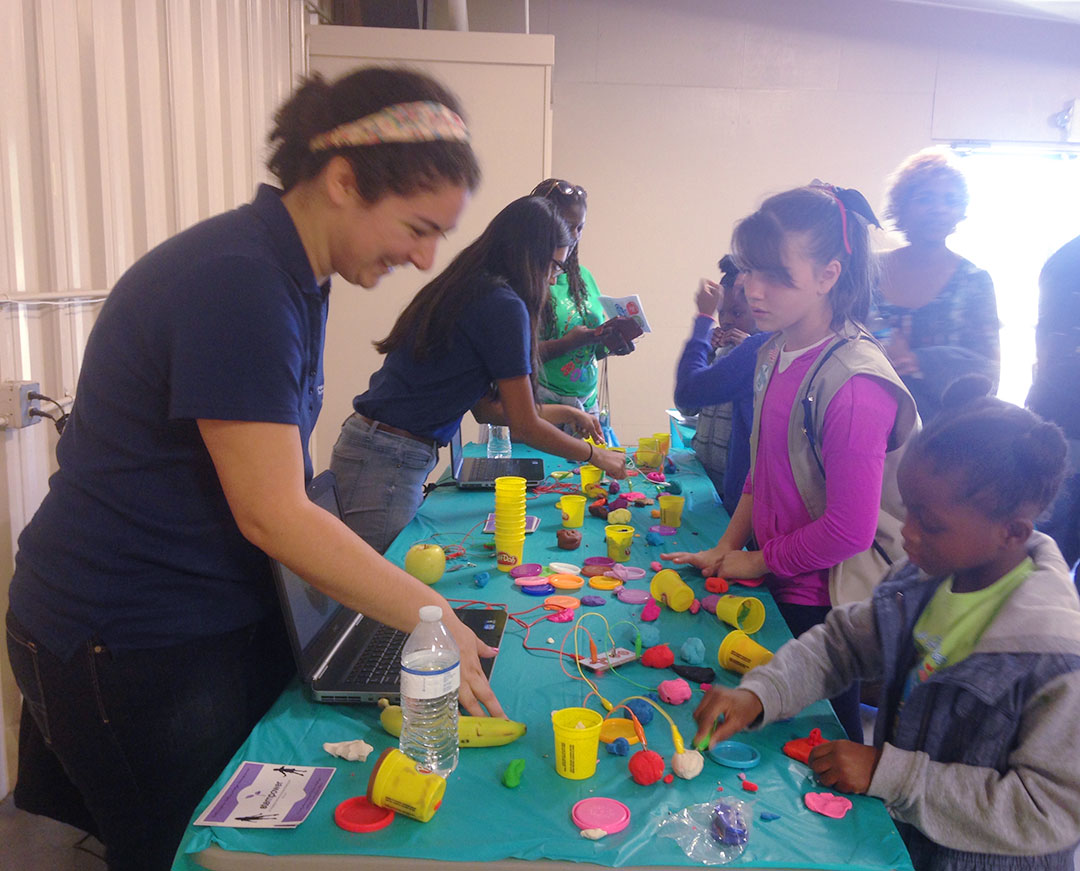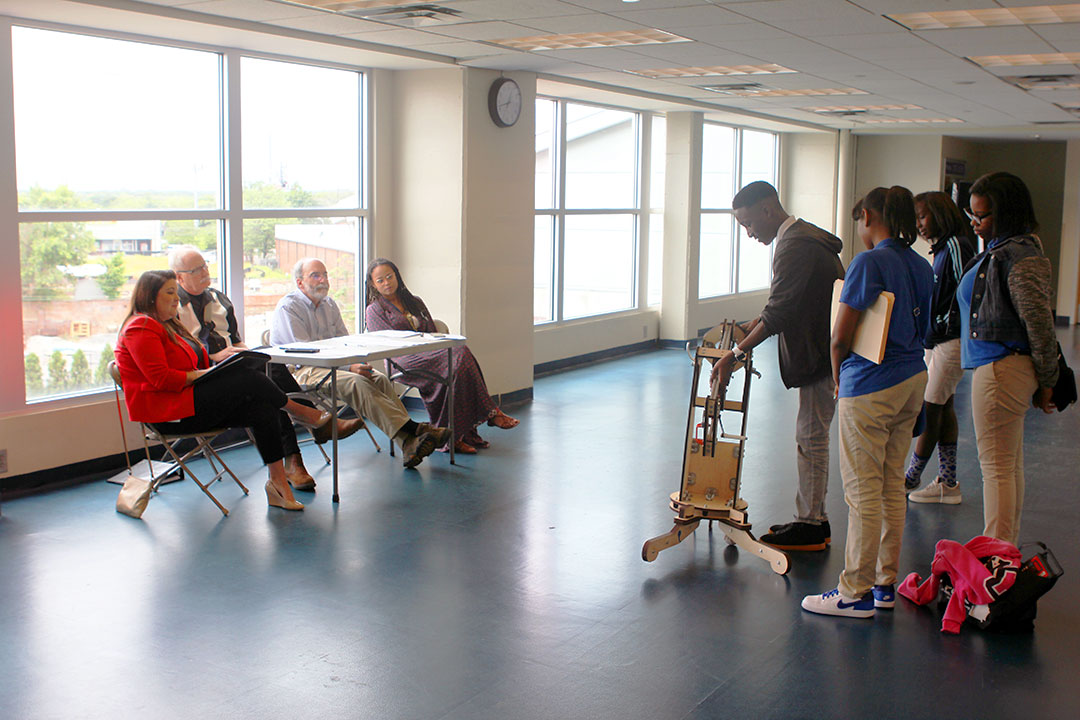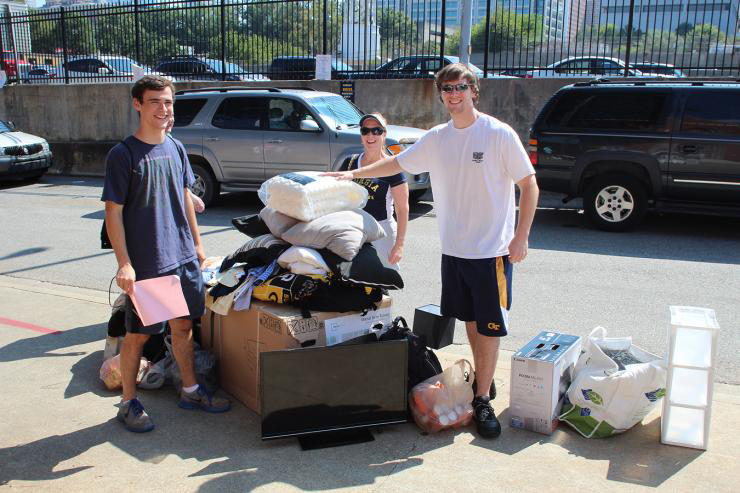
Annual Report 2017 Navigation
Making Community Connections
Supporting the members of the Tech community and the Institute’s larger communities is a top priority of the Institute.
Tech Students Mentor Girls in STEM Fields

Kaitlin Rizk, co-founder of Stempower and undergraduate in the H. Milton Stewart School of Industrial and Systems Engineering, mentors fourth- and fifth-grade Girl Scouts by encouraging them to explore STEM and learn key character values.
When five Georgia Tech women students co-founded Stempower in 2014, they wanted to boost the flagging self-confidence of young women in science, technology, engineering, and mathematics (STEM) fields, despite their natural interest and ability.
Stempower is a mentoring program offered by Georgia Tech women students that encourages girls to explore STEM and learn key character values. Partnering with the Girl Scouts of Greater Atlanta, two Stempower mentors meet bimonthly with fourth- and fifth-grade girls in a given troop. Each meeting is comprised of a different STEM activity — building rockets, making circuits, or learning to code — paired with a character lesson like encouraging questions and valuing mistakes.
Three years later, after initial support from the Grand Challenges Living and Learning Community, Stempower has become one of the outreach initiatives of the Center for the Study of Women, Science, and Technology (WST), with eight Tech mentors and 100 Girl Scout mentees in the United States. Stempower was also launched at Uganda’s Makerere University after one of the group's co-founders, Kaitlin Rizk, witnessed similar women’s empowerment issues during a service project a few years ago.
“After mentoring for years, I still clearly remember my first meeting with a troop,” said Stempower co-founder Natalie Leonard. “The meeting opened with a broad discussion about women scientists and engineers. Upon mentioning Mae Jemison, the first African-American woman astronaut, girls raised their hands and jumped up and down for the opportunity to tell me what they already knew about her. After this first meeting, I walked away impressed by their knowledge and energy, and encouraged that supporting these girls through Stempower would help each of them thrive.”
‘We put the cool in school’
Georgia Tech's CEISMC (Center for Education Integrating Science, Mathematics, and Computing) brings STEM education to K-12 audiences.

The Brown Middle School team gives an oral presentation on its baseball launcher before a panel of judges.
Georgia Tech, Atlanta Braves Sponsor STEM Competition
More than 100 metro Atlanta students, teachers, and volunteers gathered at the Georgia Tech Campus Recreation Center (CRC) last spring for the finale of the inaugural Braves STEM Competition, an event that combines STEM education and baseball.
Middle school student teams from two Atlanta public schools and four Cobb County schools used their science and engineering skills to build baseball launchers during the 2016-17 school year. Then the teams brought their launchers to the CRC to test them for accuracy. During the oral presentation portion of the competition, a panel of judges evaluated students on their STEM accuracy skills.
“Too many times, children and adults are very smart but don’t know how to explain scientific terms and concepts in a concise, coherent way,” said Mindy DiSalvo, a senior research faculty member at the Georgia Tech Research Institute (GTRI) and the competition organizer.
Physicists in GTRI’s Electro-Optical Systems Laboratory spent two months designing the launcher, and worked with GTRI Machine Services to develop materials and parts for the launcher kits.
The judges chose Cobb County’s Cooper Middle School and the team’s Star Wars-themed launcher as winners of the competition.
“STEM is fun,” said David Thompson, a Cooper Middle School student. “It’s a more advanced, rigorous environment, which I think will challenge my intellectual ability to its fullest capacity. And that’s what I really want in life — to be challenged.”
The Atlanta Braves invited the Cooper team to use their launcher to throw out the first pitch at the Braves’ May 5 game at SunTrust Park.
Recycling Program Expands to Help Feed Hungry Students

The non-perishable foods collected during student move-out helped support the Klemis Kitchen pantry, a big step in making it a long-term, self-sustaining operation.
For Georgia Tech students, moving out of campus housing has become a prime opportunity to help others, including each other.
Earlier this year, the Student Move-Out Recycling Program evolved to not only collect recyclable waste and donations, but also help feed hungry students.
In addition to its traditional role of diverting students’ unwanted furniture and other reusable or recyclable materials from dumpsters when they move out of campus housing, a more recent partnership is making a significant impact on campus. Klemis Kitchen, a free program that provides pantry items to food-insecure Georgia Tech students, received 534 pounds of non-perishable food from student donations during the 2016 move-out.
While food insecurity is not always an issue commonly associated with college students, the history of Klemis Kitchen reveals that food insecurity is not a recent development among college students, even at Georgia Tech.
“It means so much to the students who need help to realize that some of this help is actually coming from their peers and that their peers care,” said Dana Hartley, Tech’s campus liaison for homeless students. “It helps them feel less alone.”
Prepping for Atlanta United
Bobby Dodd Stadium at Historic Grant Field goes from football … to fùtbol. The stadium has hosted football games, concerts, movies, and other special events. Last spring and summer, the space was transformed into a soccer field for Atlanta United FC until the team moves into Mercedes-Benz Stadium in September. Atlanta United FC played its inaugural game against the New York Red Bulls on March 5, 2017.
Institute Diversity Honors Gender Equity Champions
In light of the 2016 Diversity Symposium theme, “Celebrating Women at Georgia Tech,” Institute Diversity created the Gender Equity Champion Awards to recognize members of the faculty, staff, and student body, and a unit (office, department, school, or lab) for significantly demonstrating gender diversity, equity, and inclusion within the campus community.
The Gender Equity Champion Award winners were honored at the Eighth Annual Diversity Symposium last fall.
Award recipients included:
- Faculty Award: Mary Frank Fox, ADVANCE Professor, School of Public Policy, and co-director, Center for the Study of Women, Science, and Technology
- Staff Award: Shannon Sullivan, graduate program manager, Coulter Department of Biomedical Engineering
- Student Award: Kendall Rankin, undergraduate student, Stewart School of Industrial and Systems Engineering
- Unit Award: School of Physics
Annual Report 2017 Navigation
(text and background only visible when logged in)

